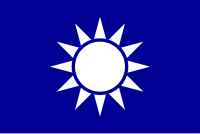Nationalist Chinese
|
Kuomintang of China
中國國民黨 Zhōngguó Guómíndǎng |
|
|---|---|
| Chairperson | Hung Hsiu-chu |
| Secretary-General | Mo Tien-hu |
| Founded | 10 October 1919 |
| Preceded by |
Tongmenghui (1905) Nationalist Party (1912) Chinese Revolutionary Party (1914) |
| Headquarters | No.232~234, Sec. 2, BaDe Rd., Zhongshan District, Taipei, Republic of China |
| Newspaper |
Central Daily News, Kuomintang News Network |
| Think tank | National Policy Foundation |
| Youth wing | Kuomintang Youth League |
| Membership (2017) | 1,090,000 |
| Ideology |
Chinese nationalism Three Principles of the People Republicanism Constitutionalism Conservatism Chinese reunification |
| Political position | Centre-right to Right-wing |
| National affiliation | Pan-Blue Coalition |
| International affiliation |
Centrist Democrat International, International Democrat Union |
| Colours | Blue |
| Legislative Yuan |
35 / 113
|
| Municipal Mayoralties |
1 / 6
|
| City Mayoralties and County Magistracies |
5 / 16
|
| Local Councillors |
386 / 906
|
| Township Chiefs |
80 / 211
|
| Party flag | |
 |
|
| Website | |
| www.kmt.org.tw | |
| Kuomintang | |||||||||||||||||||||||||||||||||||||

"Kuomintang (Guómíndǎng)" in Traditional (top) and Simplified (bottom) Chinese characters
|
|||||||||||||||||||||||||||||||||||||
| Chinese name | |||||||||||||||||||||||||||||||||||||
|---|---|---|---|---|---|---|---|---|---|---|---|---|---|---|---|---|---|---|---|---|---|---|---|---|---|---|---|---|---|---|---|---|---|---|---|---|---|
| Traditional Chinese | |||||||||||||||||||||||||||||||||||||
| Simplified Chinese | |||||||||||||||||||||||||||||||||||||
| Literal meaning | "China Nation-People Party" | ||||||||||||||||||||||||||||||||||||
|
|||||||||||||||||||||||||||||||||||||
| Abbreviated to | |||||||||||||||||||||||||||||||||||||
| Traditional Chinese | 國民黨 | ||||||||||||||||||||||||||||||||||||
| Simplified Chinese | 国民党 | ||||||||||||||||||||||||||||||||||||
|
|||||||||||||||||||||||||||||||||||||
| Tibetan name | |||||||||||||||||||||||||||||||||||||
| Tibetan | ཀྲུང་གོའི་གོ་མིན་ཏང | ||||||||||||||||||||||||||||||||||||
|
|||||||||||||||||||||||||||||||||||||
| Transcriptions | |
|---|---|
| Standard Mandarin | |
| Hanyu Pinyin | Zhōngguó Guómín Dǎng |
| Bopomofo | ㄓㄨㄥ ㄍㄨㄛˊ ㄍㄨㄛˊ ㄇㄧㄣˊ ㄉㄤˇ |
| Wade–Giles | Chung¹-kuo² Kuo²-min² Tang³ |
| IPA | [ʈʂʊ́ŋkwǒ kwǒmǐntàŋ] |
| other Mandarin | |
| Xiao'erjing | ﺟْﻮ ﻗُﻮَع ﻗُﻮَع مٍ دْا |
| Wu | |
| Romanization | tson平 koh入 koh入 min平 taon上 |
| Hakka | |
| Romanization | dung24 gued2 gued2 min11 dong31 |
| Yue: Cantonese | |
| Yale Romanization | Jūnggwok Gwokmàhn Dóng |
| IPA | [tsóŋkʷɔ̄ːk̚ kʷɔ̄ːk̚mɐ̏ntɔ̌ːŋ] |
| Jyutping | zung1gwok3 gwok3man4 dong2 |
| Southern Min | |
| Hokkien POJ | Tiong-kok Kok-bîn-tóng |
| Transcriptions | |
|---|---|
| Standard Mandarin | |
| Hanyu Pinyin | Guómín Dǎng |
| Bopomofo | ㄍㄨㄛˊ ㄇㄧㄣˊ ㄉㄤˇ |
| Wade–Giles | Kuo²-min² Tang³ |
| IPA | [kwǒmǐntàŋ] |
| Wu | |
| Romanization | koh入min平taon上 |
| Hakka | |
| Romanization | gued2min11dong31 |
| Yue: Cantonese | |
| Yale Romanization | Gwokmàhn Dóng |
| IPA | [kʷɔ̄ːk̚mɐ̏ntɔ̌ːŋ] |
| Jyutping | gwok3man4 dong2 |
| Southern Min | |
| Hokkien POJ | Kok-bîn-tóng |
| Transcriptions | |
|---|---|
| Wylie | krung go'i go min tang |
The Kuomintang of China (/ˌɡwoʊmɪnˈdɑːŋ/ or /-ˈtæŋ/,KMT; also spelled as Guomindang /ˌɡwoʊmɪnˈdɑːŋ/, GMD by its pinyin transliteration; often translated as the Nationalist Party of China or Chinese Nationalist Party) is a major political party in the Republic of China (ROC). It is currently the second-largest in the country.
The predecessor of the KMT, the Revolutionary Alliance, was one of the major advocates of the overthrow of the Qing Dynasty and the establishment of a republic. The KMT was founded by Song Jiaoren and Sun Yat-sen shortly after the Xinhai Revolution of 1911. Sun was the provisional president but he did not have military power and ceded the first presidency to the military leader Yuan Shikai. After Yuan's death, China was divided by warlords, while the KMT was able to control only part of the south. Later led by Chiang Kai-shek, the KMT formed the National Revolutionary Army and succeeded in its Northern Expedition to unify much of China in 1928. It was the ruling party in mainland China from 1928 until its retreat to Taiwan in 1949 after being defeated by the Communist Party of China (CPC) during the Chinese Civil War. In Taiwan, the KMT continued as the single ruling party until the reforms in the late 1970s through the 1990s loosened its grip on power. Since 1987, the Republic of China is no longer a single-party state; however, the KMT remains one of the main political parties. The KMT is currently the main opposition party in the Legislative Yuan.
...
Wikipedia

